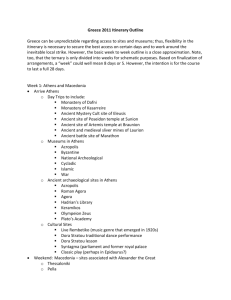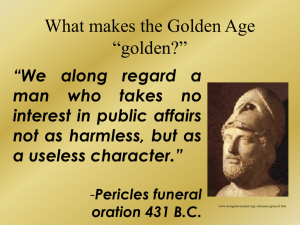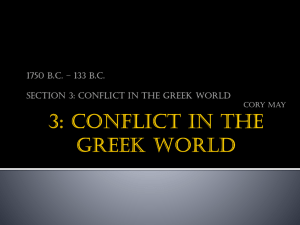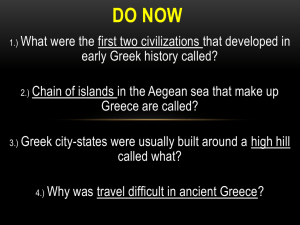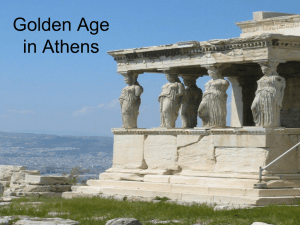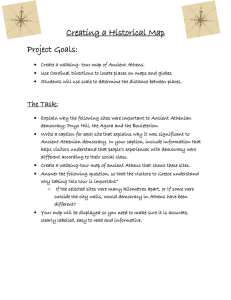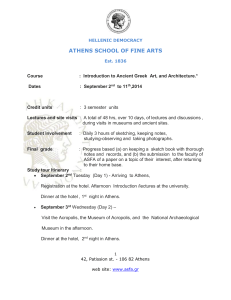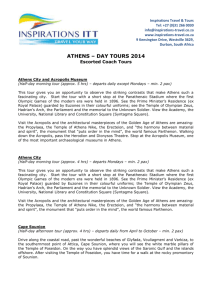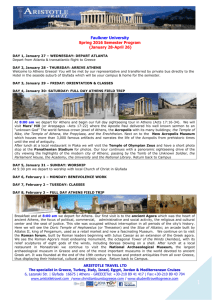UNIVERSITY OF KENT MODULE SPECIFICATION TEMPLATE
advertisement
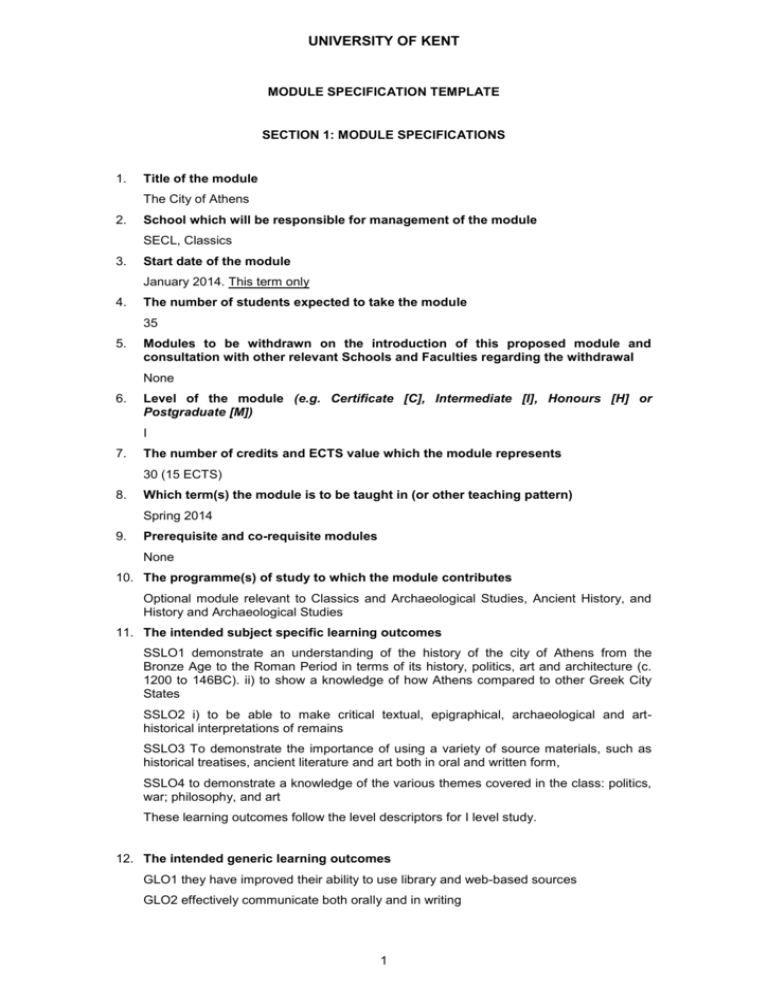
UNIVERSITY OF KENT MODULE SPECIFICATION TEMPLATE SECTION 1: MODULE SPECIFICATIONS 1. Title of the module The City of Athens 2. School which will be responsible for management of the module SECL, Classics 3. Start date of the module January 2014. This term only 4. The number of students expected to take the module 35 5. Modules to be withdrawn on the introduction of this proposed module and consultation with other relevant Schools and Faculties regarding the withdrawal None 6. Level of the module (e.g. Certificate [C], Intermediate [I], Honours [H] or Postgraduate [M]) I 7. The number of credits and ECTS value which the module represents 30 (15 ECTS) 8. Which term(s) the module is to be taught in (or other teaching pattern) Spring 2014 9. Prerequisite and co-requisite modules None 10. The programme(s) of study to which the module contributes Optional module relevant to Classics and Archaeological Studies, Ancient History, and History and Archaeological Studies 11. The intended subject specific learning outcomes SSLO1 demonstrate an understanding of the history of the city of Athens from the Bronze Age to the Roman Period in terms of its history, politics, art and architecture (c. 1200 to 146BC). ii) to show a knowledge of how Athens compared to other Greek City States SSLO2 i) to be able to make critical textual, epigraphical, archaeological and arthistorical interpretations of remains SSLO3 To demonstrate the importance of using a variety of source materials, such as historical treatises, ancient literature and art both in oral and written form, SSLO4 to demonstrate a knowledge of the various themes covered in the class: politics, war; philosophy, and art These learning outcomes follow the level descriptors for I level study. 12. The intended generic learning outcomes GLO1 they have improved their ability to use library and web-based sources GLO2 effectively communicate both orally and in writing 1 UNIVERSITY OF KENT GLO3 develop critical skills GLO4 develop their ability to work independently and in groups These learning outcomes follow the level descriptors for I level study. 13. A synopsis of the curriculum The city-state (polis) has traditionally defined the characteristic form of community life for the ancient Greeks. The Greeks so valued the autonomy and freedom implicit within this term that its preservation often led to war, the most devastating being the Peloponnesian War in the last decades of the fifth century B.C. This course will require a close reading of Thucydides’ famous account of this war. Paradoxically, these same Greeks shared a panhellenic bond that served to unify them through language, art and architecture, literature, religion, and athletics. To complicate matters further, there is a tendency today to imagine Athens as a paradigm for hundreds of other city-states. By tracing the history and culture of Athens from the Mycenaean period to the Roman, focusing particularly on the best documented classical and hellenistic periods, this course will demonstrate how truly atypical Athens was and how diverse the Greek city-states were in their histories and institutions. Athens is particularly rich in material culture, as exemplified by the excavations on the Acropolis and in the Agora, and in ancient texts. For example, the Constitution of the Athenians, attributed to Aristotle and our only surviving history of an ancient city-state, provides both a constitutional history of Athens and a detailed description of its democratic institutions in the 4th century B.C. Archaeology gives it form and substance. This course will challenge the students to become fully conversant with the primary sources of classical and hellenistic Athens, including historical, literary, philosophical, archaeological, epigraphical, artistic, architectural, and to learn that Athens cannot be reconstructed without crossing disciplines. 14. Indicative Reading List Osborne, R. Greece in the Making 1200-479 BC, 2nd ed. Rhodes, P.J. A History of the Classical Greek World 478-323 BC. 2nd ed. Thucydides. The Peloponnesian War, trans. Rex Warner Aristophanes, Lysistrata and Other Plays, trans. A.H. Sommerstein Aristotle. The Athenian Constitution. Trans. P.J. Rhodes. Penguin Classics, 1984 Wycherley, R.E. The Stones of Athens. Princeton, 1978 15. Learning and Teaching Methods, including the nature and number of contact hours and the total study hours which will be expected of students, and how these relate to achievement of the intended learning outcomes There will be 3 hours of teaching per week in lectures and seminars (3x11 weeks = 33 hours). Students will be expected to prepare for seminars by reading and discussion with their peers and to study independently towards their assessment, both the coursework essay and the in-class assignment (267 hours) The teaching maps onto the learning outcomes as follows: Lectures SSLO1, SSLO3, SSL04 Seminars SSLO1, SSLO2, SSLO3, GLO2, GLO3, GLO4 Independent study GLO1, GLO2, GLO3, GLO4 16. Assessment methods and how these relate to testing achievement of the intended learning outcomes 2 UNIVERSITY OF KENT i) One essay of 2,500 words (40%) testing SSLO1, SSLO2, SSLO3, GLO1, GLO2, GLO3, GLO4 ii) In class assignment (45 minutes) (SSL01; SSLO2, SSLO4) (10%) iii) Seminar contribution (SSLO1, SSLO2, SSLO3, GLO2, GLO3, GLO4) (10%) Two hour exam (40%) (SSLO1; SSLO2; SSLO3; SSLO4; GLO4) 17. Implications for learning resources, including staff, library, IT and space None 18. The School recognises and has embedded the expectations of current disability equality legislation, and supports students with a declared disability or special educational need in its teaching. Within this module we will make reasonable adjustments wherever necessary, including additional or substitute materials, teaching modes or assessment methods for students who have declared and discussed their learning support needs. Arrangements for students with declared disabilities will be made on an individual basis, in consultation with the University’s disability/dyslexia support service, and specialist support will be provided where needed. 19. Campus(es) where module will be delivered 1 Canterbury SECTION 2: MODULE IS PART OF A PROGRAMME OF STUDY IN A UNIVERSITY SCHOOL Statement by the School Director of Learning and Teaching/School Director of Graduate Studies (as appropriate): "I confirm I have been consulted on the above module proposal and have given advice on the correct procedures and required content of module proposals" ................................................................ .............................................. Director of Learning and Teaching/Director of Graduate Studies (delete as applicable) Date ………………………………………………… Print Name Statement by the Head of School: "I confirm that the School has approved the introduction of the module and, where the module is proposed by School staff, will be responsible for its resourcing" ................................................................. .............................................. Head of School Date ……………………………………………………. 1 Required for information purposes only. Changes of campus will not require re-approval of the module specification. 3 UNIVERSITY OF KENT Print Name SECTION 3: MODULE IS PART OF A PROGRAMME IN A PARTNER COLLEGE OR VALIDATED INSTITUTION (Where the module is proposed by a Partner College/Validated Institution) Statement by the Nominated Officer of the College/Validated Institution (delete as applicable): "I confirm that the College/Validated Institution (delete as applicable) has approved the introduction of the module and will be responsible for its resourcing" ................................................................. Nominated Responsible Officer College/Validated Institution of .............................................. Partner …………………………………………………. Print Name ………………………………………………….. Post …………………………………………. Partner College/Validated Institution Module Specification Template Last updated November 2011 4 Date
